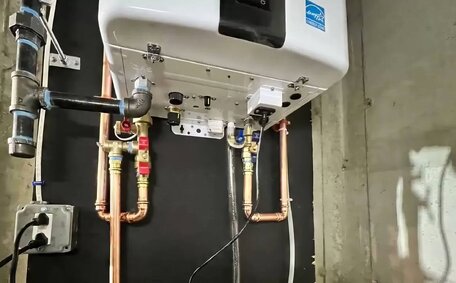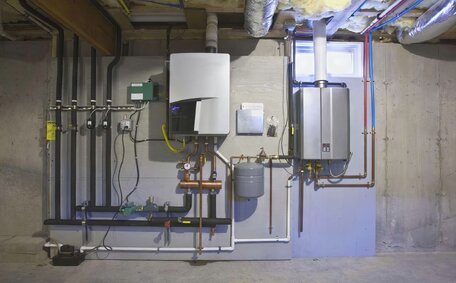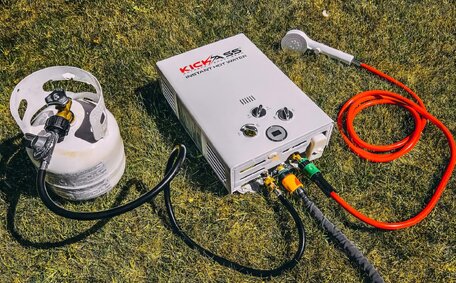Introduction to Smart Water Leak Detection Technology
Smart water leak detection technology is rapidly becoming essential, especially in places like Croydon Park, Sydney. As cities grapple with ageing infrastructure and growing populations, innovations in leak detection provide greater control over precious water resources and help mitigate damage from leaks.
Companies like Croydon Park Plumbing utilise intelligent sensors and data analytics to identify and even predict leaks before they happen. Quickly identifying issues enables smart building managers to take critical steps, such as cutting off the water supply or alerting maintenance teams.
Innovative water system solutions include sensors that monitor water flow rates and pressure. Advanced acoustic sensors detect the high-frequency sounds characteristic of water leaks. Flood sensors also serve as leak detectors, and through IoT connections, can trigger a shutoff valve. These devices stream data in real-time to cloud services, where machine learning algorithms analyse patterns and irregularities to identify leaks.
Given leaky pipes lose 28 billion litres of water each year in Australia, smart water leak detection technology is crucial for water sustainability. As water climate concerns intensify, leading water companies are prioritising leak prevention as a vital element of sustainable water governance.
Early intervention, through systems with embedded detection sensors designed to identify leaks intelligently, can dramatically reduce wasted treated water and minimise repairs.
Key Devices and Techniques for Detecting Water Leaks
There are several key devices and techniques used to accurately detect water leaks in homes and buildings:
Smart Water Sensors
Water flow sensors monitor variations in flow rates and pressure, offering vital data for detecting potential hidden leaks in plumbing networks. Wifi water sensors act as leak detectors, integrating with smart home systems to immediately send alerts when leaks are detected.
Acoustic Leak Detectors
Acoustic equipment employs microphones that can detect leaks attentively via their high-frequency sound emissions. They can pinpoint the location of pipeline leaks in walls or underground pipes through advanced noise analysis.
Pressure Monitoring
Smart home water leak detection sensors that monitor water pressure changes assist in identifying potential breaches in plumbing infrastructure. Smart algorithms learn normal pressure patterns and send alerts when prolonged drops occur, empowering you to shut off flow water quickly if a leak is identified.
Flow Metres
Flow meters, both smart and mechanical, detect unusual consumption patterns that may indicate a leak. Certain devices can automatically shut off water following the detection of excess flow.
Thermal Imaging
Infrared thermal cameras pinpoint temperature humidity and variations between different substances. They can identify cool moisture from pipes behind walls, potentially pinpointing leaks detected by a wifi water sensor.
Combining multiple smart detection techniques provides comprehensive monitoring by a smart water monitor to catch water leaks early, reducing waste. This enhances water management, as it reduces wasted clean water and prevents costly damage from uncontrolled plumbing failures.
Acoustic Sensors for Identifying Leaks
Acoustic detection systems are key in pinpointing the exact location of water leaks. They work by listening for the unique high-frequency noise signatures that leaks generate within pipes or plumbing fixtures.
Water escaping from cracks or breaches creates turbulent flow and cavitation effects. This creates noise patterns that reveal leaks emitting frequencies from 30 kHz to 200 kHz, beyond human hearing. Acoustic sensors use built-in hydrophones to detect these ultrasonic acoustic signatures, pointing to water leaks up with great precision.
Advanced digital signal processing isolates the leak noise against background pipe noise, allowing water leak detectors to operate with precision. Algorithms filter out other interfering sounds, allowing the sensor to accurately match the acoustic fingerprint to characteristics of a water leak. Software analysis determines the leak location by examining noise intensities from multiple acoustic sensors placed throughout a building.
Water companies like Croydon Park Plumbing now have acoustic listening devices installed across entire city water grids, functioning each day our to ensure prompt identification of leaks. Continuous monitoring of water distribution systems by these sensors allows for the early detection of leaks, often before any visible damage occurs. Early detection by smart water leak detectors better controls water losses topping 28 billion litres across Australia annually.
Smart leak detection technologies, similar to those used in cities like New York, together with proactive acoustic monitoring, form a critical defense line, safeguarding water resources to prevent up to 28 billion litres of losses each year, thereby enhancing climate resilience.
IoT Networking for Comprehensive Leak Monitoring
The internet of things (IoT) allows water utilities to implement extensive real-time monitoring across large infrastructure. IoT applications provide facility managers with comprehensive insights into leaks, allowing for swift action via wireless communication networks.
Brands like flo moen smart water detectors, Phyn, and others produce devices that connect to the cloud, sending alerts when leaks occur and acting as a water monitor to log water consumption trends. This data is processed by analytics platforms that are accessible from your phone and use artificial intelligence to detect anomalies, evaluate water leakage risks, and predict potential failures.
Water utilities can employ smart wifi technologies at key points in municipal pipeline networks and building infrastructures. Water leak sensors placed at metres, pumps, joints, valves and household appliances act as neural nodes, continually tracking water flows. Sudden changes prompt automated isolation of breaches or the ability to shut off the water supply through integrated smart actuators, which homeowners can set to their preferences.
Converging formerly fragmented frameworks into unified smart water systems enables fast-acting solutions that can prevent leaks from escalating. Centralised control panels identify potential issues throughout the network, decreasing dependency on customer reporting. Coordinating data and resources facilitates strategic planning for leak repairs, infrastructure improvements, and water loss management initiatives.
The advent of smart wifi water monitoring systems, powered by iot technology, indicates a shift towards predictive maintenance models, redefining the water industry paradigm. IOT technology-enabled real-time monitoring networks paired with sophisticated analytics lay down the technology foundations for what are commonly referred to as smart cities initiatives, depicting climate-resilient metropolises of the future.
Using AI and Analytics for Predictive Leak Prevention
Cutting-edge artificial intelligence (AI) technology can empower utilities to move from reactive to predictive models for water leak management. Smart metres and sensors compile massive datasets on usage, noise patterns and facilitate advanced leakage detection, assessing equipment health. Neural networks process this data to forecast potential leaks before they become major issues.
Cloud-based analytics can used to examine trends in pressure fluctuations, acoustic signatures, water quality and customer complaints. Bhyve smart flood solutions advance pattern recognition to spot anomalies and forge dynamic models of typical operations. Algorithms running simulations of infrastructure behaviour predict failure points and estimate remaining equipment lifetime.
Utilities receive actionable information to proactively target maintenance. Strategic water loss programmes preserve supplies while optimising capital expenditure.
Reports can be used to detail high-risk equipment, failure probability, and recommended interventions based on cost-benefit trade-offs. Scheduling repairs before leaks emerge extends asset lifetimes and avoids major disruptions.
Transitioning to predictive infrastructure analytics represents a significant shift for water companies.
Artificial intelligence significantly enhances detection efficacy while cutting operating costs, in contrast to outdated reactive methods. Equipped with artificial intelligence, utilities can protect not just the infrastructure but also your house by moving ahead of water damage instead of merely responding.
Installing Smart Water Leak Detection Systems
Setting up smart water leak detection systems properly requires professional expertise for seamless integration. Companies such as Croydon Park Plumbing, with their extensive expertise, ensure that detection systems are installed seamlessly to maximise effectiveness.
Key Steps for Installation
Typical installation follows these key steps:
- Leak detection survey – Technicians survey the site and develop detection plans, positioning sensors to match the building’s layout for thorough monitoring.
- Mounting – Leak sensor devices get securely mounted at strategic spots along plumbing lines, crucial for detecting leaks. Careful placement balances wide coverage with sensor density needed for accurate triangulation of leak locations.
- Networking – Devices connect via a wifi hub to the internet, allowing connectivity to the cloud management platform that controls monitoring and data analysis.
- Configuration – Devices get fine-tuned by the leak detection system to establish fluid baselines tailored to the site, ensuring accurate detection of abnormalities.
- Verification – Technicians validate all elements such as connectivity, data streams sensor function before completion.
Regular maintenance checks, which we rigorously tested for reliability, help sustain the functioning of these complex systems and ensure their effectiveness.
Professional Services for Optimal Results
Attempting do-it-yourself installation risks subpar setup and integration issues. Utilising professional services streamlines the process of getting smart leak detection systems up and running accurately and expediently.
Experienced plumbing technicians have the expertise to thoroughly map pipe networks, identifying ideal sensor placements and troubleshooting connectivity problems. Maintenance contracts make sure your systems are properly functioning, and also guarantee a level of security to protect your home and other buildings from extensive water damage.
DIY vs Professional Installation
DIY Installation
Opting for DIY installation of smart water leak detection systems may seem like an easy way to save on upfront costs. However, attempting to self-install these complex systems can only be successful with professional expertise, to avoid significant risks.
DIY installations may face challenges, including:
- Improper sensor placement can lead to limited or inaccurate monitoring
- Connectivity and integration issues leading to lacks in data flows and control
- Inability to fine-tune baseline configuration matched to the site
- Lack of testing and verification of end-to-end system functionality
Flawed DIY installation can undermine how much value these advanced systems offer in catching leaks proactively. Gaps in coverage or data connectivity mean leaks can still cause extensive damage despite the presence of sensors.
Professional Installation
Leveraging professional installation services for smart waterleak detection systems offers significant advantages over DIY attempts.
Experts like Croydon Park Plumbing tailor the detection system installations for optimal setup, including:
- Mapping pipe networks to strategically place sensors for comprehensive monitoring
- Setting up strong connectivity to cloud platforms for data handling
- Fine-tuning sensitivity thresholds matched to the site’s water flows
- Testing end-to-end system functionality before sign-off
The precision of professional installation translates into superior leakage prevention and mitigation. Technicians intimately familiar with local plumbing systems can help spot risks DIY enthusiasts would miss.
Sustained service agreements bring homeowners peace mind, ensuring systems maintain optimum detection performance throughout their operational lifespan.
Integration With Other Smart Home Devices
Connecting to Smart Home Platforms
Smart water leak detection systems can integrate with smart home platforms, such as Amazon Alexa and Google Assistant, enhancing day-to-day water usage monitoring. This enables homeowners to track home water issues and receive alerts through voice-activated interfaces like alexa google Assistant on smartphones or tablets.
Interoperability Between IoT Devices
Water leak sensor devices interact seamlessly with other Internet of Things (IoT) gadgets installed in properties. For example, our top pick for mitigating damage, smart devices like a Flo by Moen can execute an automatic cessation of your water supply when activated by a leak sensor’s alarm. Integration enables automated emergency response to prevent flooding.
Unified Controls and Monitoring
Instead of checking multiple apps, homeowners can conveniently control integrated smart home devices from one interface. Voice commands facilitate whole-house monitoring, like requesting a leak inspection or water usage report. Integration with platforms such as Alexa and Google leads to simplified supervision and control.
With comprehensive connectivity across IoT ecosystems, homeowners can use professional services from companies like Croydon Park Plumbing to keep homes safe and efficient through smart home automation.
Challenges and the Future of Leak Detection
Current Challenges
Although smart leak detection technology has improved significantly, challenges still exist:
- Aged infrastructure can compromise detection capabilities if pipe materials dampen sensor signals.
- High initial costs, especially when compared with basic models, can deter adoption as municipal water systems often face tight modernisation budgets.
- Integration complexities exist when overlaying sensors onto legacy systems.
Consumer hesitation and knowledge gaps can slow the adoption of leak detection technologies. Nevertheless, the substantial benefits of these technologies underscore the pioneering efforts of specialists like Croydon Park Plumbing.
The Future of Leak Detection
Ongoing enhancements in accuracy, connectivity and intelligence will expand applications for smart water tech. Emerging smart technologies solutions include:
- Printed sensors offer a cost-effective approach for extensive whole home coverage.
- Fiber optic sensor cables can enhance long-range wireless protocols that connect extensive sensor arrays.
- Satellite imaging and drones identifying subsurface leaks.
- AI-powered platforms can predict pipe breaks months in advance, preventing system failures.
As costs drop and cities pilot projects, leak detection technology will reach mainstream adoption. And specialists like Croydon Park Plumbing will remain key partners for municipalities and building owners to implement smart water infrastructure.






